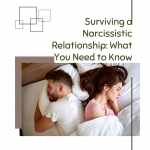 Escaping a narcissistic relationship can feel like trying to leave a maze with ever-changing walls. At times it can be disorienting, confusing, and downright frightening. Narcissists are master manipulators, and they use a mix of love bombing, gaslighting, and emotional abuse to keep their partners ensnared. If you or someone you know is trying to break free, understanding the following safety tips can be life-saving.
Escaping a narcissistic relationship can feel like trying to leave a maze with ever-changing walls. At times it can be disorienting, confusing, and downright frightening. Narcissists are master manipulators, and they use a mix of love bombing, gaslighting, and emotional abuse to keep their partners ensnared. If you or someone you know is trying to break free, understanding the following safety tips can be life-saving.
1. Trust Your Instincts
One of the hallmarks of a narcissistic relationship is gaslighting – a manipulative tactic where the abuser makes the victim doubt their own reality. If something feels off, it probably is. Listen to that inner voice and trust your feelings.
2. Develop a Safety Plan
Before making a move, have a plan in place:
- Find a safe place: Consider staying with a trusted friend, family member, or at a domestic violence shelter.
- Pack an emergency bag: Include essentials like clothes, identification, important documents, money, and any necessary medications. Hide this bag somewhere safe and accessible.
- Inform trusted individuals: Make sure someone knows about your plans and can check in on you.
3. Secure Important Documents and Finances
Narcissists may try to maintain control by withholding money or important documents. Ensure you have copies of all crucial paperwork (birth certificates, passports, bank details, etc.). Open a separate bank account if possible, and start saving money discreetly.
4. Change Passwords and Boost Online Privacy
Consider changing the passwords on all your online accounts, including social media, email, and banking. Use two-factor authentication where possible. Be cautious about sharing your whereabouts online.
5. Seek Professional Support
Therapists, counselors, or domestic violence hotlines can offer guidance, resources, and emotional support. They can help you navigate the complex emotions and practical challenges you might face when leaving.
6. Set Boundaries
If you must interact with the narcissist, set strict boundaries. For instance, decide that you won’t respond to provocations or engage in arguments. Stick to your rules and stay firm.
7. Keep Communication to a Minimum
If you can avoid communication, do so. If you must communicate (especially if children are involved), use written methods like emails or texts, as these provide a record. Avoid personal meetings unless absolutely necessary and, when they are, ensure they’re in public or with a trusted person present.
8. Prioritize Your Physical Safety
Narcissists can become aggressive when they feel they’re losing control. Always meet in public places, tell someone about your whereabouts, and have an escape plan. If threats or violence ensue, don’t hesitate to involve law enforcement.
9. Document Everything
Keep records of all interactions, especially if they’re abusive or threatening. This documentation can be invaluable in legal situations or when seeking restraining orders.
10. Seek Legal Advice
If you’re married, share property, or have children together, it’s crucial to understand your rights. Consult with a lawyer to discuss options and prepare for potential challenges.
11. Join a Support Group
Knowing you’re not alone can be incredibly comforting. Joining a group where members have been through similar experiences can provide support, understanding, and practical advice.
12. Stay Connected with Trusted Friends and Family
Isolation is a tool many narcissists use to control their partners. By staying connected with your support network, you can maintain perspective, get validation, and have individuals who can check on your wellbeing.
13. Understand It’s Not Your Fault
Remember, narcissistic abuse is never the victim’s fault. Narcissists are master manipulators who have honed their skills over time. Don’t blame yourself.
14. Consider a Restraining Order
If the narcissist continues to harass or threaten you after the relationship ends, consider obtaining a restraining order. Your safety should always be the top priority.
In Conclusion
Leaving a narcissistic relationship is not only about breaking emotional ties; it’s about ensuring your safety at every step. Prioritize your wellbeing, and don’t be afraid to seek help. Everyone deserves a life free from manipulation and abuse, and with the right resources and support, you can reclaim your life and pave the way for a brighter future.
Start your healing journey by Rising From the Ashes
Rising from the Ashes: The Journey to Narcissistic Recovery and Emotional Healing is the perfect workbook for abuse survivors. It is designed to help you recover from emotional abuse and take control of your life.
WHY YOU NEED IT:
👉🏼Provides a roadmap for emotional healing
👉🏼Helps identify and overcome negative patterns
👉🏼Teaches healthy coping mechanisms
👉🏼Encourages self-love and self-care
👉🏼Offers a safe space for reflection and growth






Leave a Reply